Almaty is a city that vibrates with life. It was also my gateway to Kazakhstan. As I stepped out of the airport, a friend of a friend picked me up and the next minutes were a crash course on how the city worked.
We stopped by a roadside restaurant where I was forced to try every meat dish, and I was also introduced to kompot, which I fell in love with and which would become my go-to drink throughout my trip. After arranging a Kcell 3G simcard for me, my friend looked at me and said “are you ready for Almaty?”
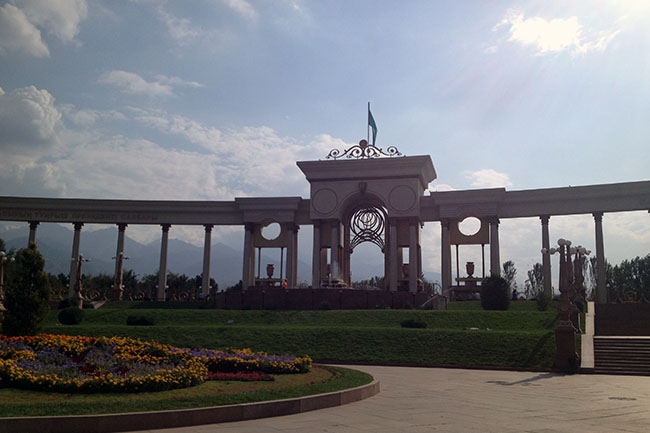
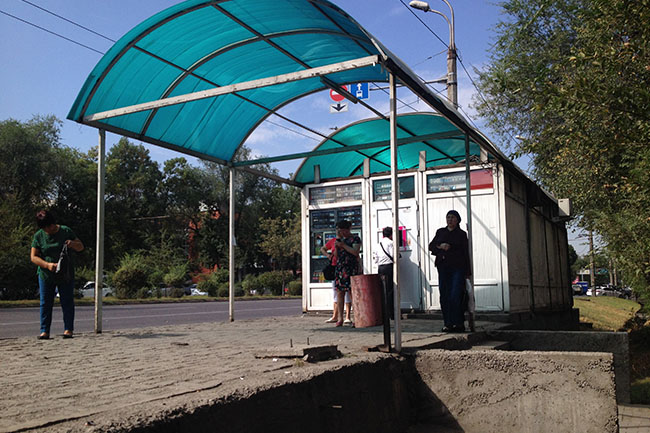
My whole trip had been improvised in less than a week, and I didn’t really know anything about Kazakhstan or had any plans besides flying into and from Almaty, so I was hooked on anticipation for a few minutes while we walked our way back to a big road.
There, he stood facing the incoming cars, and pointed to the ground with the index finger of his right hand. It seems like Kazakh had their own version of the thumb up.
Within a minute we hurled ourselves into the back of an Audi 80, and my friend was grinning while looking at me. I soon discovered what “being ready” meant. Even though the road had your typical two or three lanes per direction, these were packed, so it was common practice to overtake other cars using the lanes for the opposite direction.
Our young driver, and a dozen more, would zig-zag between our lane and those of incoming cars, and would keep changing speeds non-stop, from 0 to 90, then brake, then 100, then brake, then speed up, then dodge an incoming car in the last second before a crash, then speed up again and survive another near-death experience.
Incoming cars would do the same, and a bird view from those roads would probably look like a zipping line, with the cars of the two innermost lanes of each direction constantly switching places to move forward. Life can’t wait in the streets of Almaty, you’d better race for it.
My friend made a remark on how peaceful the road was that day, and told me about a guy who rode an ostrich through the streets of Almaty half a year before.
At one point, the driver stopped the car completely and had us all smash our foreheads into the seats in front; there was a police car in sight. The policemen did not seem to be bothered at all by that driving practice, but it was somehow deterrent for the locals. As soon as the police car was gone, the crazy driving started again, and in the end we made it to our place.
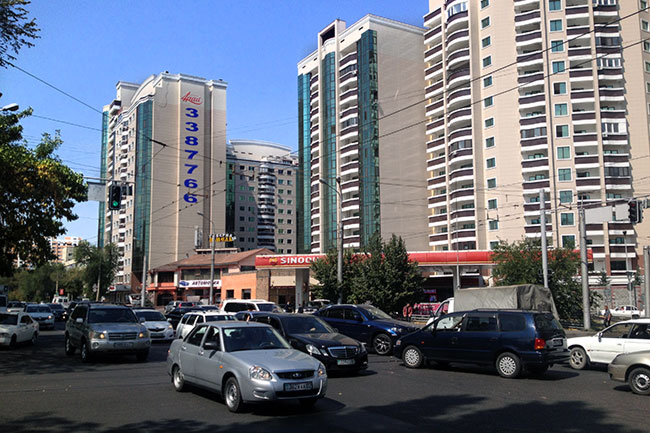
I realized that the sides of the streets were filled with people hitching rides. That turned out to be the only true way to get around the city, and around the country.
In the West, hitchhiking is regarded as something dangerous. In Kazakhstan, it was perfectly safe for all sorts of riders (women, men, young, old, with kids…), and I was really happy that it worked that way.
Of course, this could not work in any modern society, but at the same time it is extremely beautiful. You have this 1 million people who live in Almaty, who everyday commute by getting a ride from a complete stranger. Thousands of lives intermingle every hour of every day,
thousands of life experiences exchanged. I was not around enough to draw any real statistics, but to me that seems like an amazing way to humble down a society and bridge the gaps that may exist within its different groups.
They pay pocket money (sometimes about 1€ for a half hour ride), and they find rides practically everywhere.
This of course extends to the rest of the cities in the country, and adds a lot of fun to the art of travelling. Of course, foreigners are asked ten times a regular price, so it is up to the traveller to learn about distances and prices, a few words to bargain, and maybe the Kazakh Cyrillic alphabet so that you know where you are.
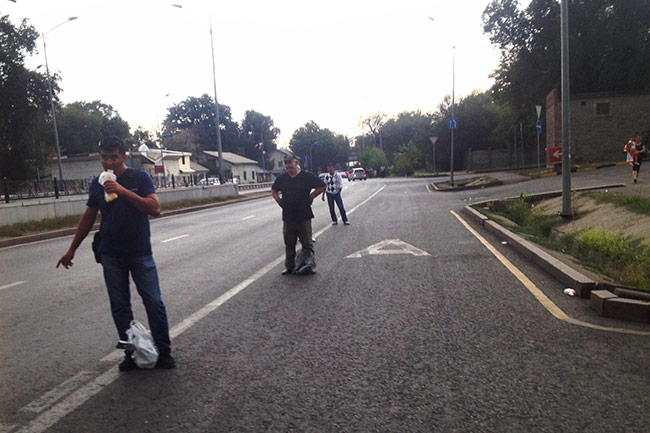
It took me a few days to master the art of bargaining like a local, and then it was very satisfactory. Locals would pull over and ask you for stupid amounts of money, and would then laugh when you offer the regular amount.
After ten or twenty seconds, they would stop laughing and would look at you with a warm look on their faces, and would let you in like family.
Oftentimes they would then start endless conversations in Kazakh or Russian, and I would remain silent and smiling, using basic vocabulary now and then to prevent those conversations from becoming monologues.
During my first hours in the city I could only learn the names for drinks and foods, and that was absolutely enough to keep the fire going for endless conversations with random locals who drove me through nameless streets. One thing at a time.
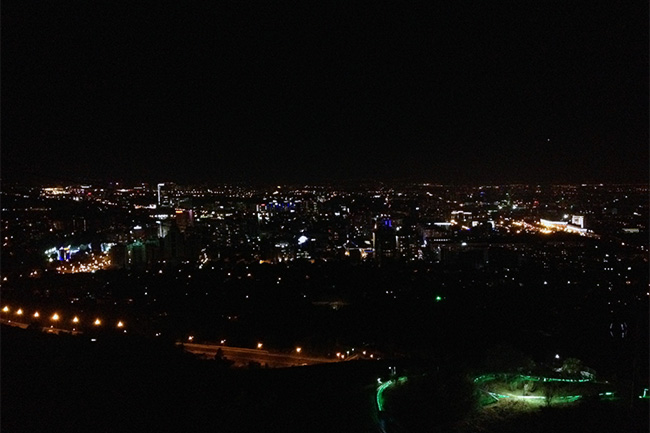
In the afternoon, the leafy streets of Almaty give way to a frantic nightlife. There is a major lack of street lights, so the first night out was a bit unsettling.
Sure enough, we still took rides from complete strangers whose faces we could not even see, and I soon discovered myself laughing and drinking in bars, parks and clubs.
Almaty is definitely a university city, and the whole student body of the country seems to reside there. It is really big and dark at night, so it’s one of those cities where you really need to know where the party’s at. Otherwise, you will only find desolated, poorly lit alleys that might feel unsafe and dangerous (and cold).
Once you hit the right places, though, you can be sure the night will be memorable, and you will definitely be introduced to many a heavy drink that Kazakh seem to chug like water.
In case you party hard in Almaty, it is very important that you know that sparkling Tahn is available at small supermarkets. This drink is made of diluted yoghurt, and is basically milk mixed with chilled water. It is very popular throughout Middle East, and it is the best cure for hangover.
It’s the grid block layout, the trees clothes in dyed wool, the unlit avenues, it’s strangers who help strangers, go the extra mile for strangers. Strangers who smile at strangers and challenge each other to alcohol-fueled SUV-powered street races. And trams who were removed because of too many accidents. Almaty is all of that and so much more.
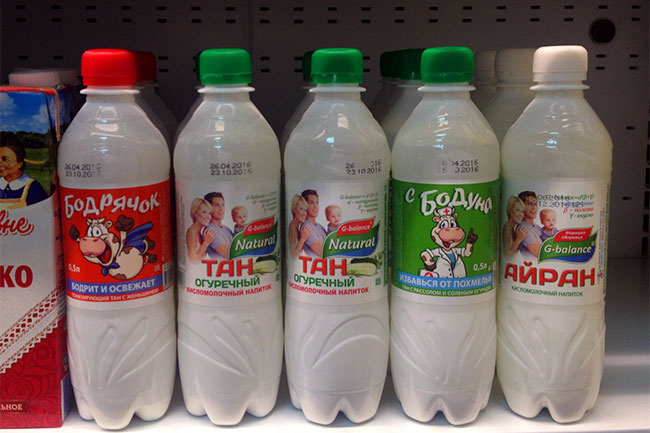
Featured photo credits: Andrei Shevelev. Check out his awesome pictures!